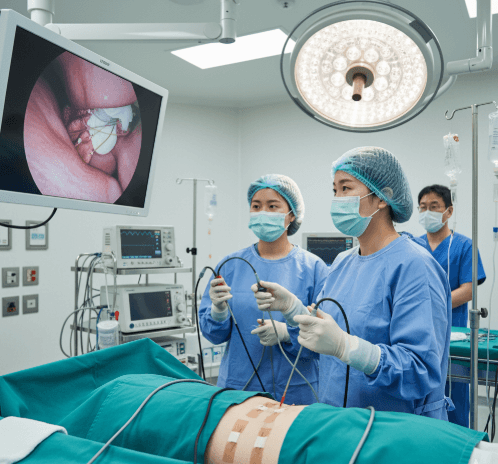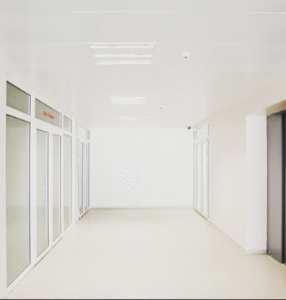What it is
Tubal ligation, often referred to as “getting your tubes tied,” is a permanent form of female sterilization. In this procedure, the fallopian tubes are cut, tied, or sealed to prevent eggs from traveling from the ovaries to the uterus, making pregnancy impossible.
✔️ Surgical method: In Korea, it is most commonly performed through laparoscopic surgery (minimally invasive keyhole surgery).
✔️ Effectiveness: More than 99% effective in preventing pregnancy.
✔️ Permanence: Considered irreversible, although reversal surgery may sometimes be attempted.
➡️ The laparoscopic approach uses small incisions and a camera, allowing for faster recovery and less pain compared to open surgery.
Why it’s done
Women in Korea may choose laparoscopic tubal ligation for:
🔹 Permanent contraception – no need for pills, IUDs, or implants
🔹 Medical reasons – when pregnancy poses a health risk
🔹 Personal choice – for those who have completed their families
🔹 Highly reliable – once done, no further contraceptive methods are needed
💡 Highlight: Tubal ligation is an excellent choice for women who are absolutely sure they do not want future pregnancies.
Alternatives
Since tubal ligation is permanent, it is important to consider alternatives:
➡️ Hormonal IUDs – long-term (3–5 years), reversible option
➡️ Copper IUDs – hormone-free, effective up to 10 years
➡️ Nexplanon implants – 3-year effective contraceptive rod
➡️ Birth control pills or patches – daily or weekly methods
➡️ Vasectomy (male sterilization) – simpler and less invasive permanent option for couples
⚠️ Note: A doctor in Korea will carefully discuss alternatives and permanence before proceeding with tubal ligation.
Preparation
Before undergoing laparoscopic tubal ligation in Korea, preparation includes:
✔️ Detailed consultation with a gynecologist to confirm decision
✔️ Medical history review – checking for conditions that may affect surgery
✔️ Blood tests and imaging – to ensure overall health and pelvic anatomy
✔️ Fasting before surgery – usually required for several hours
✔️ Consent form – patient signs acknowledging the permanent nature of the procedure
💡 Tip: Korean clinics prioritize thorough counseling to make sure the decision is final and informed.
How it’s done
The laparoscopic tubal ligation procedure in Korea typically takes 30–45 minutes and is performed under general anesthesia.
Steps include:
- Anesthesia administration → Patient is put to sleep for comfort and safety.
- Small incisions → Usually near the navel and lower abdomen.
- Laparoscope insertion → A thin tube with a camera allows the surgeon to see inside the abdomen.
- Fallopian tube sealing → Tubes are cut, clipped, cauterized, or tied.
- Incision closure → Small stitches or surgical tape are used to close the skin.
⏩ The minimally invasive technique means less scarring, less pain, and quicker recovery compared to traditional surgery.
Recovery
Recovery after laparoscopic tubal ligation in Korea is generally fast:
✔️ Most women go home the same day or after an overnight stay.
✔️ Mild pain or bloating is common for a few days.
✔️ Return to work in about 3–5 days, depending on physical activity level.
✔️ Full recovery in 1–2 weeks.
✔️ Sexual activity can usually be resumed after about 1 week, as advised by the doctor.
When to contact a doctor:
➡️ Severe abdominal pain or heavy bleeding
➡️ Fever or signs of infection at the incision site
➡️ Persistent nausea or vomiting
💡 Important: Tubal ligation is safe, but as with any surgery, complications such as infection, bleeding, or damage to nearby organs can occur.
Treatment option in Korea
Korea is well-regarded for advanced laparoscopic surgery techniques. Women choosing tubal ligation in Korea benefit from:
⭐ World-class hospitals and clinics with modern laparoscopic equipment
⭐ Highly skilled Korean gynecologic surgeons
⭐ Short hospital stays with fast recovery due to minimally invasive techniques
⭐ Affordable procedures compared to many Western countries
⭐ Multilingual medical support in large hospitals for international patients
💡 Highlight: Choosing tubal ligation in Korea ensures precision, safety, and professional aftercare, making it a trusted option for women seeking permanent contraception.
Key Highlights
✔️ Permanent contraception with over 99% effectiveness
✔️ Minimally invasive laparoscopic surgery with fast recovery
✔️ One-time procedure – no need for daily or monthly contraceptives
✔️ Professional counseling provided to confirm decision
✔️ Korean healthcare system ensures advanced, safe, and affordable options













